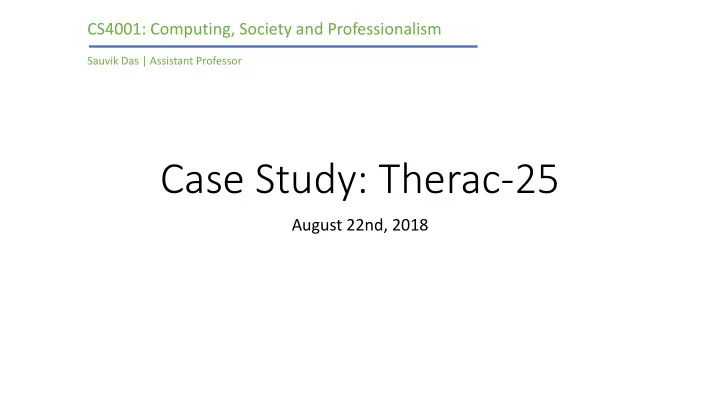

CS4001: Computing, Society and Professionalism Sauvik Das | Assistant Professor Case Study: Therac-25 August 22nd, 2018
• Therac machines are linear accelerators that target cancer sites with highly-concentrated beams of radiation • Targeting very important! Destroys malignant and benign tissue • Therac-20 had optional PDP-11 control, plus built-in hardware interlocks for safety. The Context • Was used safely for years. • Therac-25 used only software safety checks, much of it reused from Therac-6 and Therac-20 • Cut down on costs • But software is prone to bugs. More code, more bugs. • 11 installed machines; 6 malfunctions; 3 deaths
What Happened?
Example Case 1: • Kennestone Regional Oncology Center, Marietta, GA • Breast cancer patient, receiving therapy on nearby lymph nodes • Felt a “tremendous force of heat” when the machine was turned on • Technician on site (Tim Still) contacts AECL about possible bug, but was told it was impossible • Later found out that she received between 15,000 – 20,000 rads (typical dose is 200, 1000 can be lethal if delivered to whole body). • Shoulder/arm was paralyzed, breast had to be removed
Example Case 2: • Ontario Cancer Foundation • Patient came in for 24 th treatment. Operator put in routine dosage • Therac shut down after 5 seconds an error message, saying No Dose had been administered. Operator hit “proceed” command to deliver dose. • Repeated process 4 times. • Patient complained of a burning sensation around treatment area (hip) • Later hospitalized. Died because of cancer, but would have needed total hip replacement because of radiation overexposure
Example Case 3: • East Texas Cancer Center • Experienced operator made a mistake in configuring the treatment • Entered “x” for x-ray, when she meant to enter “e” for electron • Realized her mistake after entering all the other parameters and fixed the mistake by using keyboard navigation shortcuts • Audio / video facilities weren’t working that day, so operator couldn’t see patient • Turned on beam, but the treatment stopped prematurely and reported an underdose. So she proceeded with the treatment. • Unbeknownst to operator, patient felt strong pain after the first beam and attempted to get up when second beam hit. Was banging on the door to alert her to stop
People involved in the tragedy • Programmers and testers • Radiation Physicists • Operators • Patients • Hospital management • AECL Employees
• Programmers and testers • Radiation Physicists • Operators • Patients Group Activity: • Hospital management People/ • AECL Employees • FDA Entities Pick one of the above stakeholders and discuss: involved What was their moral responsibility? What did they do? What could they have done differently?
In your same groups, pick a few of the listed factors below and discuss their role in the incidents: • Overconfidence in software • Confusing reliability with safety Group Activity: • Lack of defensive design • Failure to eliminate root causes What were the • Focus on bugs instead of systemic fixes causal factors? • Complacency • Unrealistic risk assessments • Code reuse • Safe vs friendly user interfaces • User and government oversight • Error reporting
NYT 2010 Report: What Happened? • Tongue cancer patient (Scott Jerome Parks) • Computer crashed, operator didn’t realize that the third instruction (that guides multi-leaf collimator and shapes the resulting beam) was not saved • No hardware safegaurds • Didn’t run test (staffing shortage) • Breast cancer patient: (Alexadra Jn-Charles) • Programming error: “wedge OUT” instead of “wedge IN”, resulting in unfiltered beam • Other therapists didn’t catch error (through 27 sessions)
Class Discussion: What should have happened? • What kind of regulations and check may be put in place to minimize any of the errors that were reported to occur? What should have happened?
People respond to their work environment • Pressures • Staffing shortages • What is rewarded • Most of you won’t work on life-critical systems, but will still affect people’s lives profoundly – what are examples? • This course is about giving you the tools to handle the tougher calls
• When is automation good? Group Activity: • When is it not good? Automation • What checks should be in place to ensure automation is safe and reliable?
• When is code reuse good? Group Activity: • When is it not good? Code Reuse • What checks should be in place to ensure reuse is safe and reliable?
Next class • Read Writing Arguments Chapters 1 & 2 • Don’t forget to start working on Homework 1 • Mini-assignment: • Ask older family member of friend: What is the most significant change computer technology has made in your life? For better? For worse? • What change surprised you most?
Recommend
More recommend